Dr Edward Fielden, a medical practioner, is fondly remembered in Bracknell for his work in the early-to-mid twentieth century. Local stories recount how Dr Edward Fielden served the community and helped the impoverished. Many people in Bracknell can picture the Fielden clock which stood for many years in the High Street. No biography of Dr Edward Fielden or the origin of the Fielden clock appears to exist and as the clocks recently went back at the end of October, our Project Archivist decided to investigate and find out more.
Did you know that the Fielden clock used to be known by a different name? Read on to find out more.
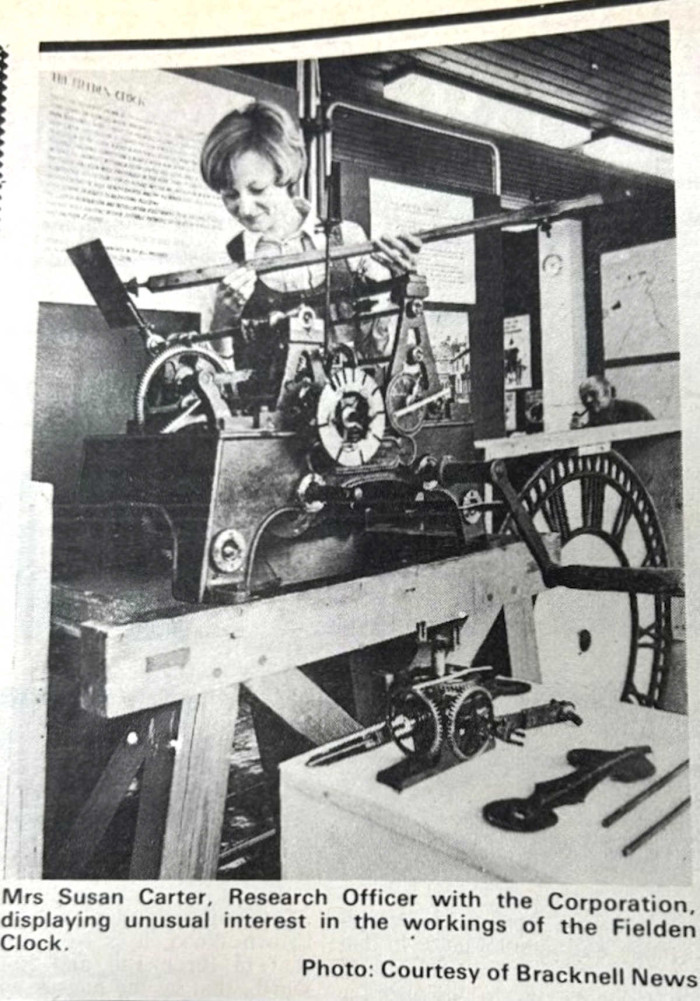
This press cutting shows one of the Corporation's Research Officer’s examining the mechanism of the Fielden clock in 1977. The inner workings of the clock are a sight only a few have seen in person.
History of the Fielden clock
The Forest Hotel was built in 1901 and stood on the corner of Church Road and the eastern end of Bracknell High Street. The Bracknell and Wokingham College stands on the site of The Forest Hotel today.
Soon after its creation The Forest Hotel commissioned a clock. In 1902 a clock was made by Gillett and Johnston of London. At its construction, the clock, had a wooden bed with cast iron bed plate. The clock may have originally had 3 faces, with another face later added. Clockmakers and repairers Gillett and Johnston produced many clocks including the Manchester Town Hall clock and the Freedom Clock, Berlin.
For many years the clock was known as The Forest clock. It stood in a turret on top of the Forest Hotel overlooking the High Street and Church Road.
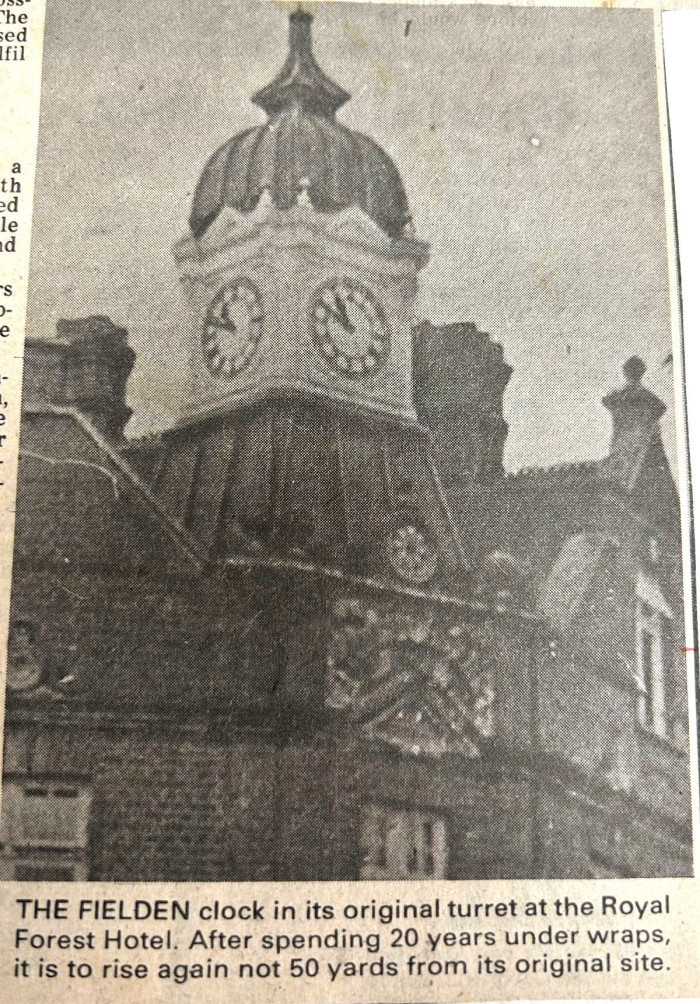
In 1915 Dr Edward Fielden is recorded as living at The Forest and The Gables, both on Church Road, Bracknell. Fielden turned The Forest, from a hotel into his waiting room and surgery while The Gables was his personal residence. The Forest may have also later served as the Fielden family’s personal residence.
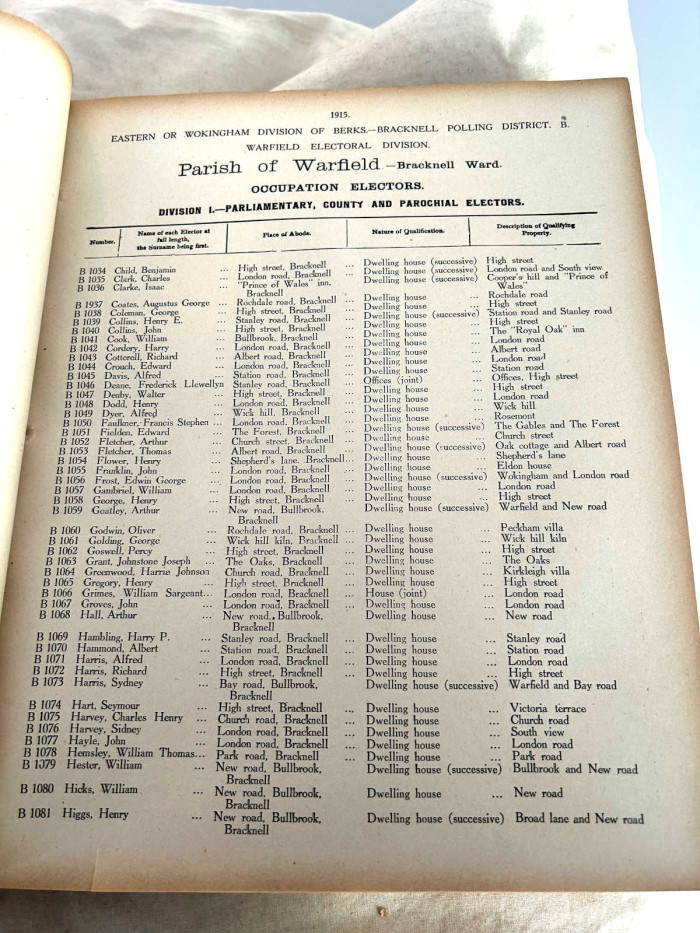
It seems during Dr Fielden’s ownership of The Forest or perhaps after his death, the clock gained the name the Fielden clock from local residents. As Dr Fielden purchased The Forest around 1914, only 12 years after the clock was created, and as he was a well-liked and important local figure, it's easy to understand why its original name was forgotten and the name the Fielden clock has endured.
The clock stood for many years in The Forest. Between 1956-1957 the Bracknell Development Corporation acquired The Forest from Dr Fielden’s wife, Mrs Maud Jennie Fielden and her representatives.

The Forest Hotel was demolished by the Corporation in 1958 to make way for development of the High Street as part of the construction of Bracknell New Town. The turret that housed the clock was too damaged to be saved. The clock including its mechanism, however, were in working order. The clock had been previously damaged and in early 1949 was sent for repairs by the Fielden family.
From 1958-1978 the clock was maintained and stored by the Bracknell Development Corporation, and later exhibited with accompanying display boards, at the Corporation’s exhibition hall at 35 Broadway between September-December 1977.
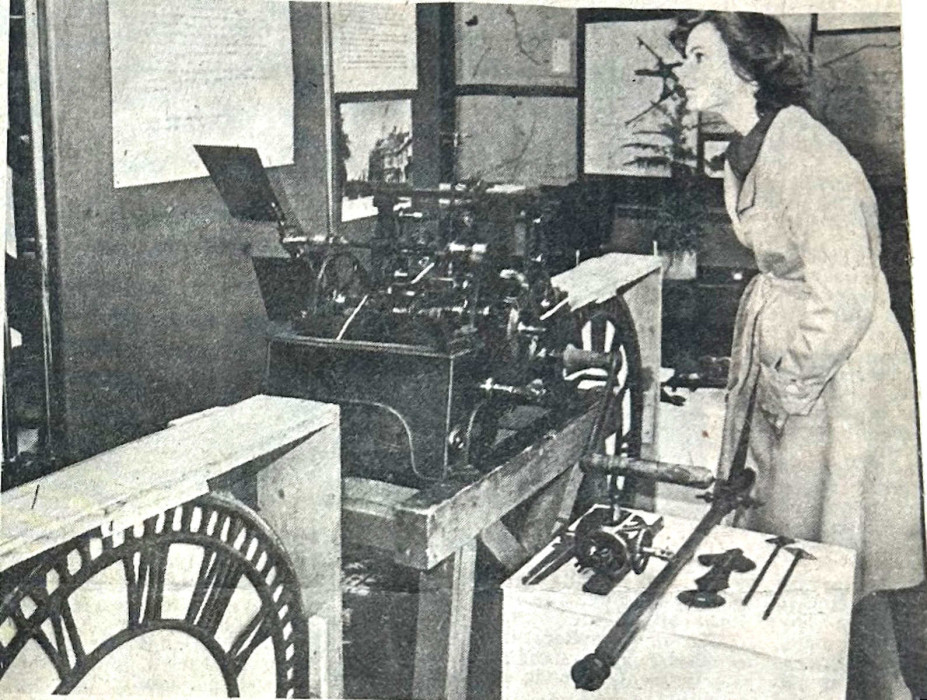
The Bracknell Development Corporation worked to reinstate the Fielden clock. The Fielden clock was popular with residents who wanted it incorporated into the New Town and the Corporation wanted to preserve as much of Bracknell’s history as possible. Residents must have enjoyed looking at the clock and remembering Dr Fielden.
The Fielden clock was later transferred from the Corporation to Bracknell Town Council and installed at Fielden House. The 121-year-old Fielden clock, is no longer on display and is owned to the present day by Bracknell Town Council.
Life of Dr Fielden: family, work, war and football
Edward Fielden was born in March 1871 in Shildon, Durham to Dr Samuel Fielden, a medical practioner and his wife Jane Reed. The 1891 census notes that Edward Fielden, age 20, was a medical student in Durham.
Dr Edward Fielden is first recorded as working in Bracknell in the 1901 census. In 1901 Dr Edward Fielden was aged 30, living at 50 Church Road, alongside a servant and housekeeper. In 1902 he married Maud Jennie Armstrong, who was born around 1875 in Northumberland.
At some point, Dr Edward Fielden purchased The Gables, Church Road. Dr Fielden’s son, Edward Hedley Fielden, was born at The Gables in December 1903.
The electoral register for 1904 notes the Fieldens living at Kirkleigh Villa and The Gables which stood side by side on Church Road.
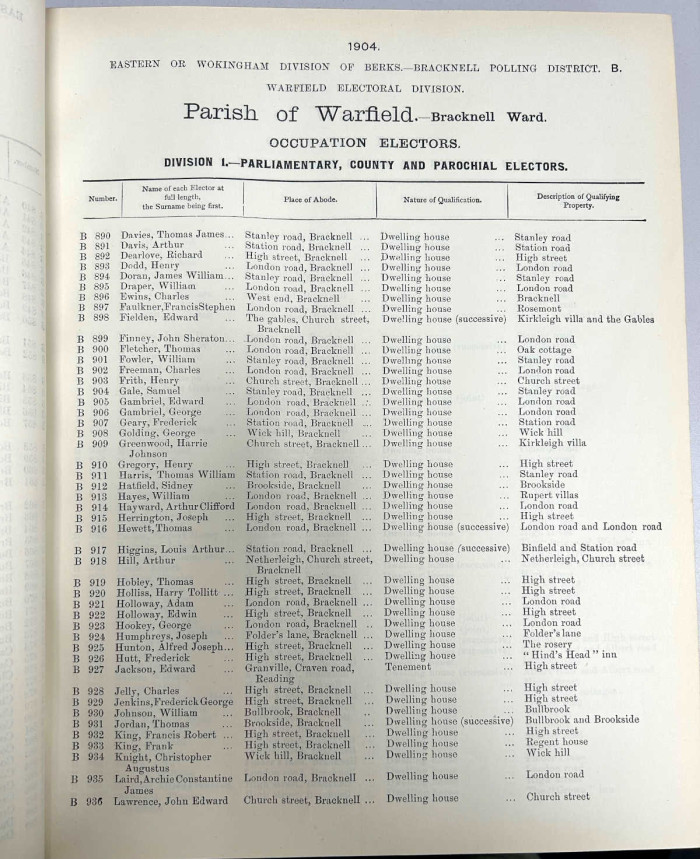
For many years Dr Edward Fielden was Medical Officer and Public Vaccinator for Bracknell and the surrounding district. He is warmly remembered for providing inexpensive and reliable healthcare in a time before the NHS existed. An oral history interview with past Bracknell resident Patricia Gates, from the 1980s reveals that ‘[Dr] Fielden would offer a service where residents could pay 6d a week and would offer free and discounted healthcare to residents.’ Details of the recording can be found on the Wessex Film and Sound Archive (based at Hampshire Archives and Local Studies) online catalogue.
By 1915 Dr Fielden operated his medical surgery from The Forest. During the Great War 1914-1918, Dr and Mrs Fielden generously allowed part of the Forest to be used as a War Work Depot. Every Wednesday-Friday there were 100 workers making sandbags, dressings, pyjamas, clothing and other goods which were sent to troops on the Western Front. You can find details of this in the Reading Mercury, 11 September 1915, available on the British Newspaper Archive.
Dr Edward Fielden served as Medical Officer at the Oaklea Auxiliary Hospital in Bracknell during World War One. This newspaper cutting notes Vice-Admiral Fleet, CBE, County Director of the British Red Cross Society ‘tendered his thanks to Dr Fielden for the gratuitous service rendered by him’ at Oaklea.
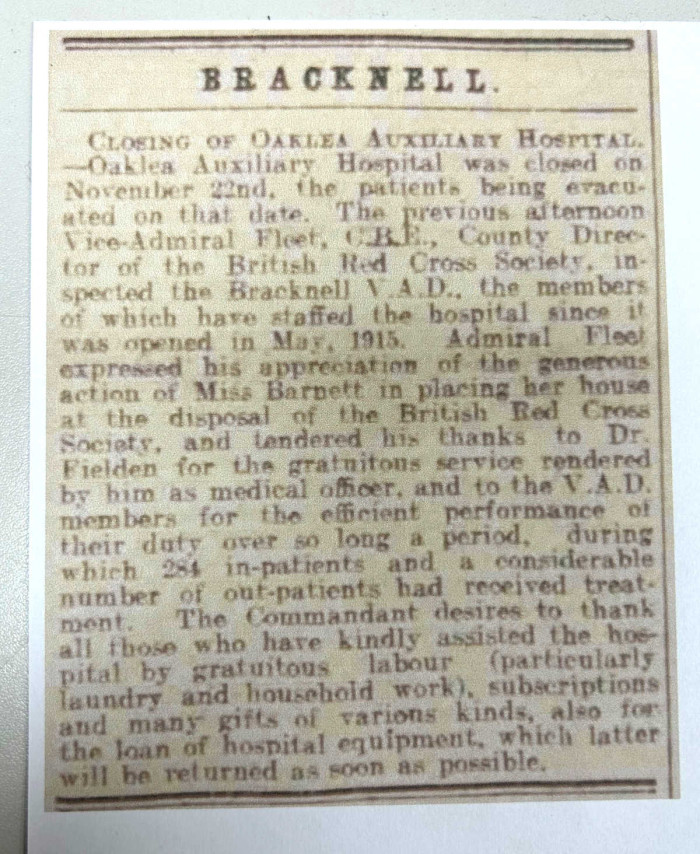
Oaklea Auxiliary Hospital opened in May 1915 and was organised by Mrs L Berwick of Sunnryrise, Bracknell, and held at Oaklea, which was owned by Miss Barnett. Oaklea may have also stood on Church Road. The Oaklea Auxiliary Hospital was closed on November 22nd 1918, just 11 days after the Armistice.
Oaklea Auxiliary Hospital had 284 inpatients and ‘a considerable number of outpatients had received treatment’ during its time as an auxiliary hospital. Those sent to Oaklea for convalescence had smaller injuries such as non-life-threatening bullet wounds. Oaklea Auxiliary Hospital was staffed by volunteers from the British Red Cross, who were too old or too young to serve in Military Hospitals. Staff would agree to 3-month contracts, although some may have volunteered at Oaklea Auxiliary Hospital for longer.
Dr Edward Fielden is further remembered in Bracknell and perhaps further afield, for his involvement in sports. He was involved with Bracknell Cricket Club and is believed to be the founder of the Fielden football cup, which teams compete against one another for to the present day.
During the early twentieth century, the Fielden Cup began. In these early years the Fielden Cup was presented to the winners by Dr Fielden himself. Binfield Football Club won the trophy in 1924 and were awarded the cup by Dr Fielden suggesting the cup has been part of local football history nearly a century or even longer.
Dr Edward Fielden is noted to have kicked off the final between Binfield Football Club and Wokingham Football Club on 6th May 1939. The match winners, Binfield Football Club were presented the trophy and medals by Edward Hedley Fielden, Dr Fielden’s son. You can find details of this in the Reading Mercury, May 1939, available on the British Newspaper Archive.
Vice-Air Marshall Sir Edward Hedley Fielden served in the RAF. From 1929, he served as pilot and later additional equerry for the then Prince of Wales and later His Majesty King Edward VII. Sir Edward Hedley Fielden continued as pilot to His Majesty King George VI and in 1947, was appointed captain of King’s flight for His Majesty King George VI and later the Queen’s flight for Her Majesty Queen Elizabeth II.
By 1939, a 68-year-old Dr Edward Fielden had moved from The Gables and lived with his wife at Newtown Cottage, Easthampstead. He died aged 77 in around 1948.
Fielden’s work and generosity serving the community, had a significant impact on the people he helped. Bracknell’s residents’ past and present may know someone who Dr Fielden helped and may have even been helped by Dr Fielden themselves. The Fielden clock, once The Forest clock, is a lasting legacy of Dr Fielden’s life.
Sources used for this article by the project archivist:
C/CL/R1/12/3
C/CL/R1/23/3
NT/B/G/18/1
NT/B/G/26/1/28
NT/B/G/26/2/6
AV1287/7/S1, Wessex Film and Sound Archive, WFSA online catalogue
Reading Mercury 16 August 1902 (available via RBA searchroom)
Reading Mercury 11 September 1915 (available via RBA searchroom)
Reading Mercury 30 November 1918 (available via RBA searchroom)
Reading Mercury 6 May 1939 (available via RBA searchroom)
1891 census, The National Archives (available via RBA searchroom)
1901 census, The National Archives (available via RBA searchroom)
MH 106/2162/240, The National Archives reading room
